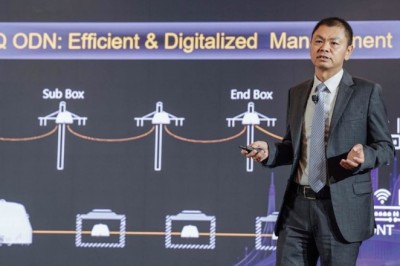
AWS Region will enable customers to run workloads and securely store customer content in the Kingdom of Saudi Arabia while serving end users with even lower latency
New Region reflects AWS’s long-term commitment to meeting high demand for cloud services in the Kingdom of Saudi Arabia and across the Middle East
AWS plans to invest more than $5.3 billion (approx. 19.88 billion SAR) in the Kingdom of Saudi Arabia
AWS will establish two new innovation centers and investment will include upskilling students, local developers, and the next generation of local talent at any stage in their career with access to cloud computing skills
Amazon Web Services (AWS), an Amazon.com company (NASDAQ: AMZN), today announced it will launch an AWS infrastructure Region in the Kingdom of Saudi Arabia in 2026. The new AWS Region will give developers, startups, entrepreneurs, and enterprises, as well as healthcare, education, gaming, and nonprofit organizations, greater choice for running their applications and serving end users from data centers located in the Kingdom of Saudi Arabia, ensuring that customers who want to keep their content in-country can do so. As part of its long-term commitment, AWS is planning to invest more than $5.3 billion (approx. 19.88 billion Saudi riyal) in the Kingdom of Saudi Arabia. For more information about AWS Global Infrastructure, visit aws.amazon.com/about-aws/global-infrastructure.
“Today’s announcement supports the Kingdom of Saudi Arabia’s digital transformation with the highest levels of security and resilience available on AWS cloud infrastructure, helping serve fast-growing demand for cloud services across the Middle East,” said Prasad Kalyanaraman, vice president of Infrastructure Services at AWS. “The new AWS Region will enable organizations to unlock the full potential of the cloud and build with AWS technologies like compute, storage, databases, analytics, and artificial intelligence, transforming the way businesses and institutions serve their customers. We look forward to helping Saudi Arabian institutions, startups, and enterprises deliver cloud-powered applications to accelerate growth, productivity, and innovation and spur job creation, skills training, and educational opportunities.”
“The partnership with AWS and their announcement of an AWS Region, backed by a $5.3 billion investment, ignites a new era of technological excellence and innovation for the Kingdom,” said His Excellency Engineer Abdullah Alswaha, Kingdom of Saudi Arabia Minister of Communications and Information Technology. “This cloud Region demonstrates a firm commitment to research, innovation, and empowering entrepreneurs to achieve prosperity for our region and the world.”
The new AWS Region will consist of three Availability Zones at launch, adding to the existing 105 Availability Zones across 33 geographic regions globally. With today’s announcement, AWS has plans to launch 18 more Availability Zones and six more AWS Regions in Malaysia, Mexico, New Zealand, the Kingdom of Saudi Arabia, Thailand, and the AWS European Sovereign Cloud. AWS Regions consist of Availability Zones that place infrastructure in separate and distinct geographic locations. Availability Zones are located far enough from each other to support customers’ business continuity, but near enough to provide low latency for high availability applications that use multiple Availability Zones. Each Availability Zone has independent power, cooling, and physical security and is connected through redundant, ultra-low-latency networks. AWS customers focused on high availability can design their applications to run in multiple Availability Zones to achieve even greater fault tolerance.
AWS offers the broadest and deepest portfolio of services, including analytics, artificial intelligence (AI), compute, database, Internet of Things (IoT), machine learning (ML), mobile services, storage, and other cloud technologies. Customers from startups to enterprises to public sector organizations and nonprofits will be able to use advanced technologies from the world’s leading cloud to drive innovation, meet data residency preferences, achieve lower latency, and serve demand for cloud services in the Kingdom of Saudi Arabia and across the Middle East.



















Facebook Conversations
Disqus Conversations